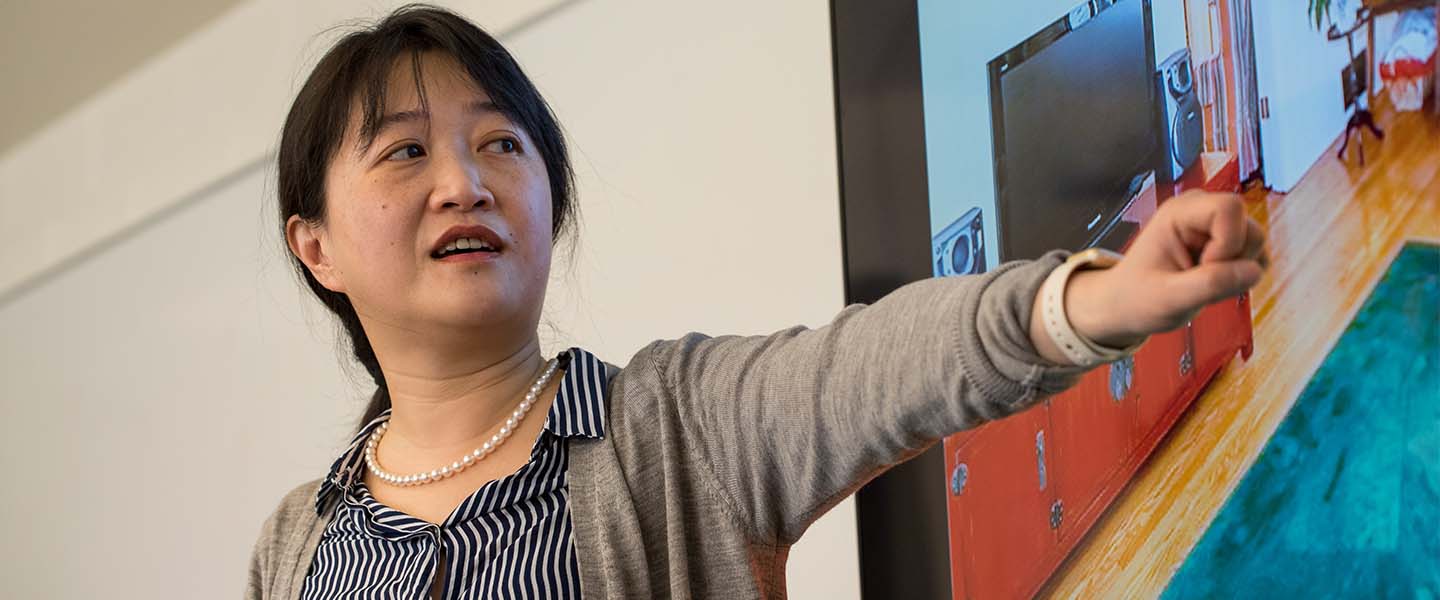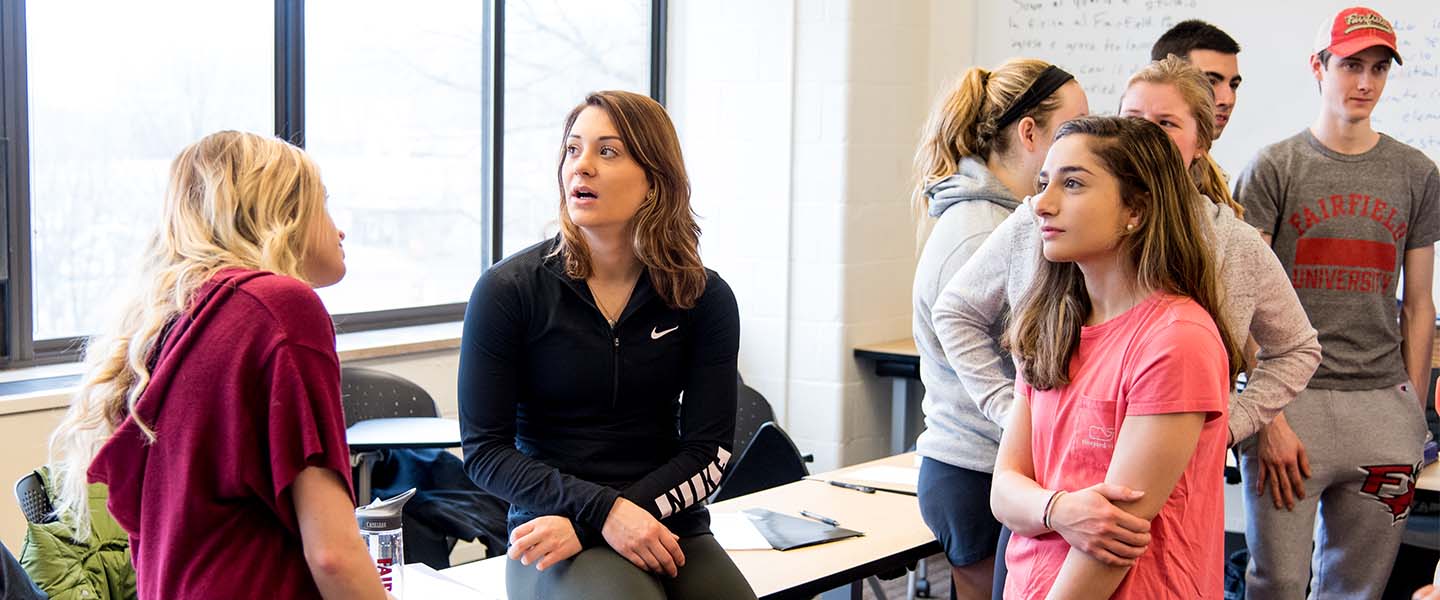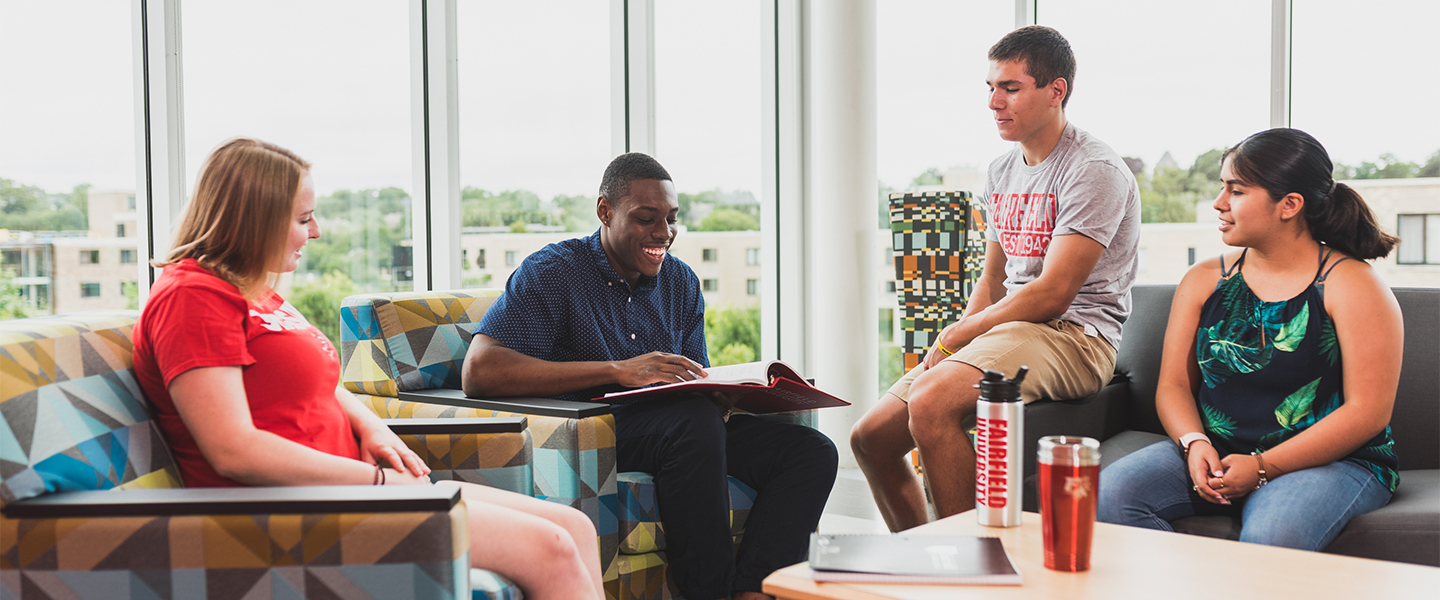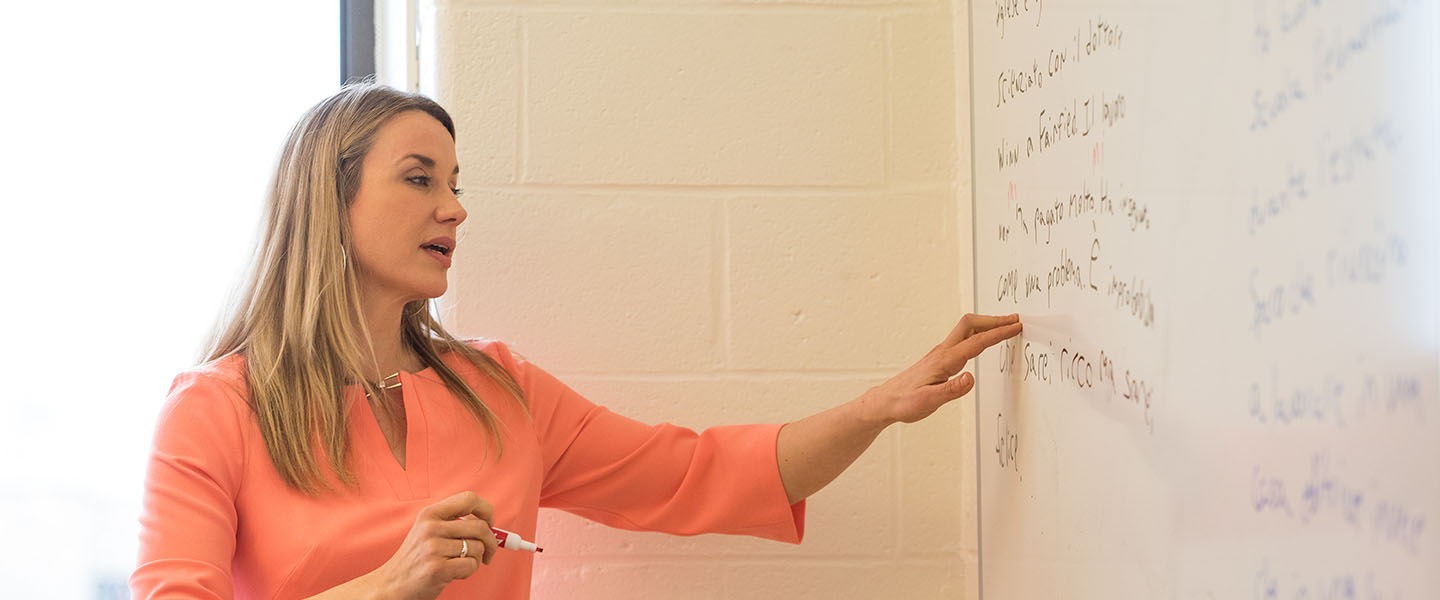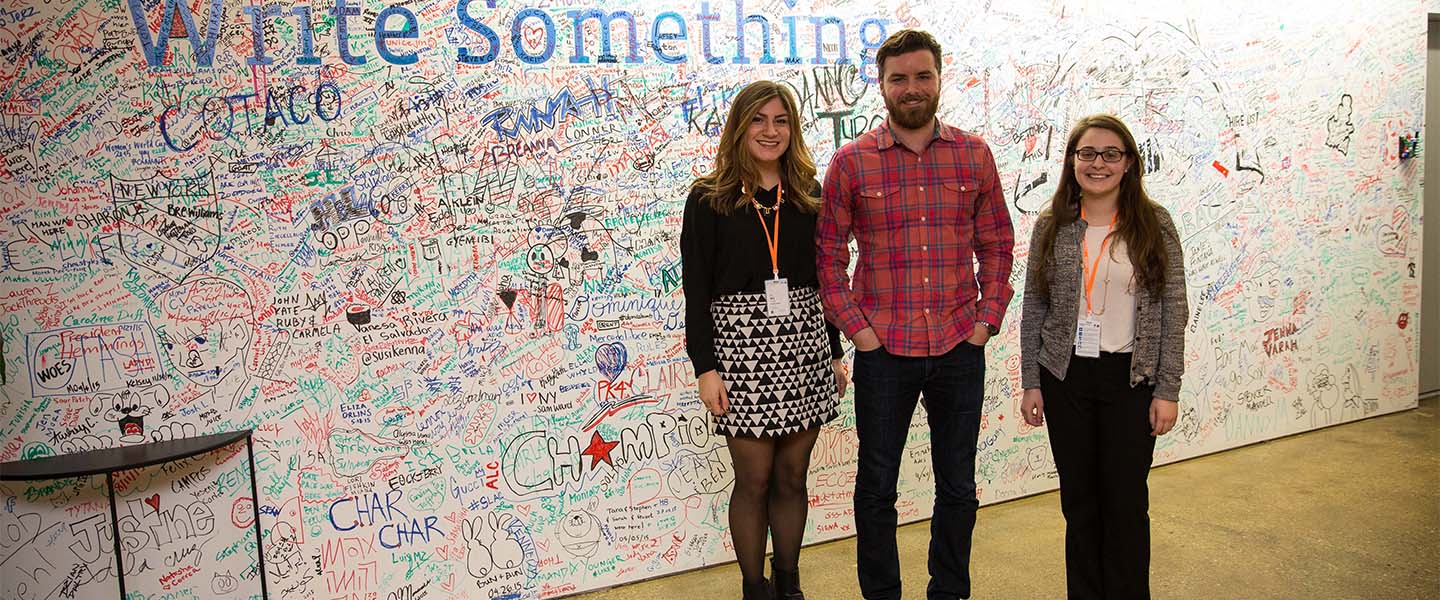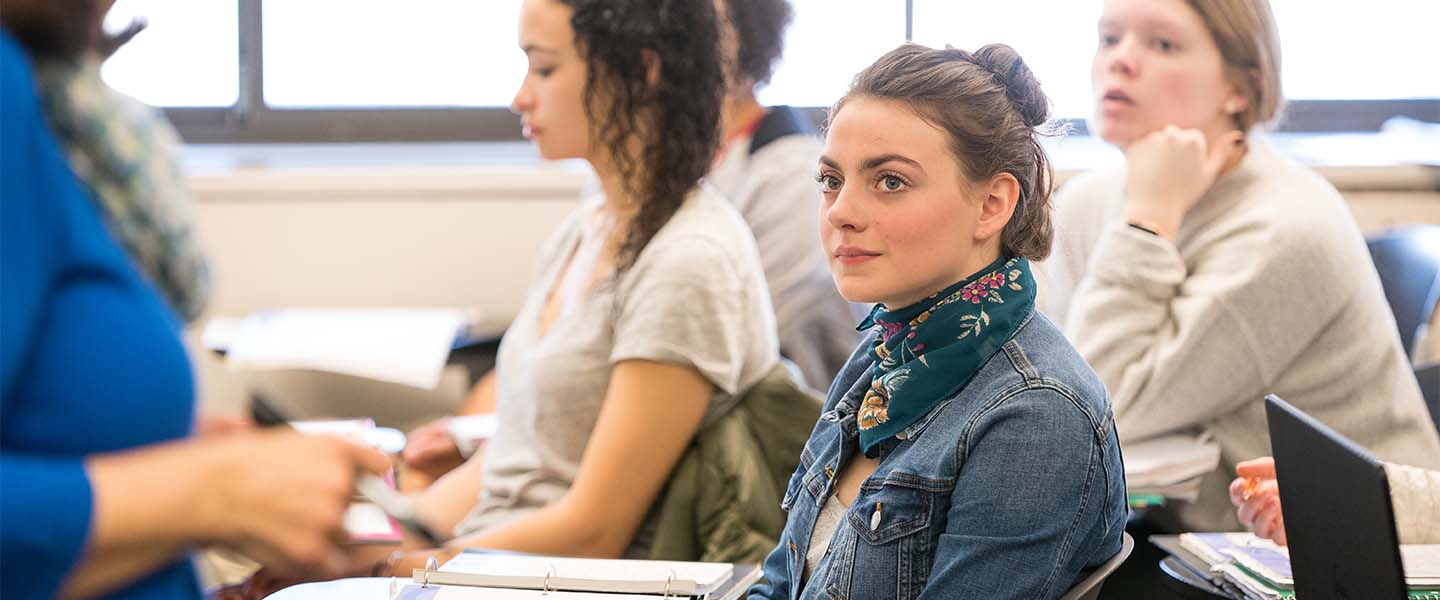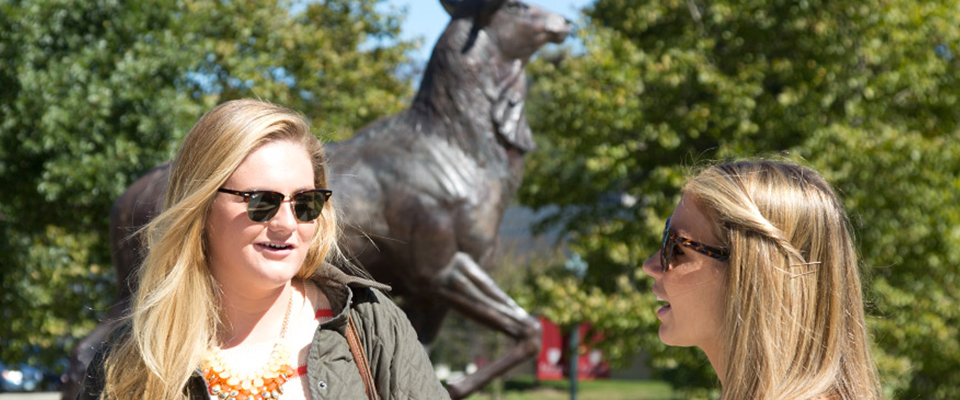On This Page
Program Overview
The study of modern languages, as well as cultures and literatures in their original languages, is an intellectual experience that allows students to recognize and embrace language and cultural diversity. Language learning goes beyond the development of linguistic skills: it fosters creativity, tolerance, and inclusion, while promoting the development of critical thinking skills.
The Department of Modern Languages and Literatures stresses proficiency in all language skills, as well as the development of a cultural awareness, to prepare students for careers in business, communication, education, government, health sciences, social work, translation and interpreting, and related professions. Similarly, our varied coursework encourages the study of bi/multilingualism and bi/multiculturalism in the context of the United States and around the world. This work is locally and nationally crucial in the U.S. where there are over 300 languages spoken, and that, at least, 20% of the U.S. population speaks a language other than English.
The Department of Modern Languages (MLL) offers courses in the prominent modern languages of the world, including Chinese, French, German, Italian, Brazilian Portuguese, Russian, and Spanish. As a MLL major, you will expand your proficiency in another language other than English and prepare yourself for a life and career in a progressively global world.
In addition to its own programs, the Department of Modern Languages and Literatures participates in the International Studies program and the minor programs in Asian Studies, Communication Media Studies, Educational Studies, Health Studies, Italian Studies, Judaic Studies, Latinx, Latin American and Caribbean Studies, Russian, East European, and Central Asian Studies, Peace and Justice Studies, Visual and Performing Arts, and Women, Gender, and Sexuality Studies. Additionally, many of our courses fulfill Magis Core Signature Elements. Select language courses may count toward those programs.
A limited number of courses taught in English may count toward specific majors and minors. Courses offered by other departments may count as well. Please consult individual directors of the French, German, Italian, and Spanish sections for a list of relevant courses from outside the department not already listed in this section of the Catalog.
Modern Languages and Literatures courses requiring a prerequisite may allow students with suitable life or academic experience from other institutions to be admitted by permission of the instructor. Students who believe they have appropriate background experience may petition the professor for admission to desired courses.
Note: Education minors need a minimum of 30 credits in the language area, of which at least three credits must be in literature and three in culture/civilization.
Modern Languages and Literatures | Fairfield University
Contact Us
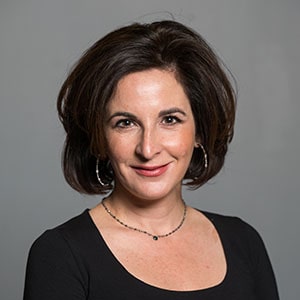
Michelle Leigh Farrell
Associate Professor
Modern Languages & Literatures
x3687
Office of Undergraduate Admission
P: (203) 254-4100
F: (203) 254-4199
admis@fairfield.edu
Requirements
The core language requirements for the Class of 2022 and earlier may be fulfilled by successfully completing two semesters at the intermediate level of any language listed among the offerings of the Department of Modern Languages and Literatures. Students should see the specific requirements for the Dolan School of Business, Egan School of Nursing and Health Studies, and School of Engineering.
Starting with the Class of 2023, please refer to the Magis Core curriculum, which states that at least one semester of a second language must be taken at Fairfield University by all students, complemented by either a second language course in the same language or a second math course. Note that students must first complete a language placement exam before registering for the course, if applicable, in order to continue in the same language that was studied previously.
Core mission statement
The study of languages is a key element in working and learning across cultures and geographical boundaries. Language in the Core Curriculum focuses on the acquisition of the skills of reading, listening, speaking, and writing, with varied emphasis according to the chosen language. Students in core language study acquire knowledge about cultures, literatures, and historical periods. It is expected that students will use the skills and knowledge acquired in language courses in practical and intellectual pursuits.
Through their study of languages, students will:
- Be able to read a passage of moderate difficulty in their chosen language and communicate with a speaker of that language
- Learn grammatical and syntactical rules which will facilitate oral and written expression in the language
- Become acquainted with the life, customs, and cultural traditions where the language is spoken
French Major
For a 30-credit major in French, students complete the following:
| Requirement | Credits |
|---|---|
| Complete at least 7 courses taught in French1 | 21 |
| Complete 2 additional courses from the department's French offerings or from the list of approved courses in other departments | 6 |
| Complete one capstone seminar taught in English | 3 |
| Total Credits | 30 |
1These may include FREN 2210 and above and/or approved courses from study abroad partner institutions (list available upon request).
Students select their course of study from a variety of offerings including courses on composition and conversation, creative writing, translation, France's culture, francophone cultures, literature and film. French majors also have the opportunity to apply for internships that count towards the major. Students are encouraged to study abroad in France or in a francophone country either during the junior year or in the summer. The final course for the French major must be taken at Fairfield University.
All majors are urged to work closely with an advisor of their choice, as soon as possible, to plan a program of study.
Magis Core Curriculum
Beginning with the Class of 2023, all undergraduate students are required to complete the Magis Core Curriculum. Please refer to the Curricula section of the undergraduate catalog for a detailed explanation of the Magis Core.
French Minor
For a 15-credit minor in French, students complete the following:
| Requirement | Credits |
|---|---|
| Complete at least 4 courses taught in French1 | 12 |
| Complete 1 additional course from the department's offerings in French or English, or from a list of approved courses in other departments | 3 |
| Total Credits | 15 |
1These may include FREN 2210 and higher and/or approved courses from study abroad partner institutions (list available upon request).
Students select their courses in consultation with a departmental advisor.
Course List:
| Code | Title | Credits |
|---|---|---|
| FREN 2210 | Intermediate French I | 3 |
| FREN 2211 | Intermediate French II | 3 |
| FREN 2219 | French Syntax and Expression | 3 |
| FREN 2220 | Topics in Language and Culture | 3 |
| FREN 2230 | Topics in Frencg Classical Theater | 3 |
| FREN 3251 | Culture & Civilization of France and the Francophone World I | 3 |
| FREN 3252 | Culture & Civilization of France and the Francophone World II | 3 |
| FREN 3265 | French Translation Workshop | 3 |
| FREN 3267 | French Commercial Culture | 3 |
| FREN 3271 | Contemporary French Press & Media | 3 |
| FREN 3980 | Internship | 3 |
| FREN 3990 | Independent Study | 3 |
| FREN 4301 | Survey of Literature in French I | 3 |
| FREN 4302 | Survey of Literature in French II | 3 |
| FREN 4305 | French & Francophone Women Writers | 3 |
| FREN 4366 | Film & Literature in French | 3 |
| FREN 4999 | Capstone Seminar | 3 |
The following list of courses taught in English has been approved to count toward the French major and minor:
Course List:
| Code | Title | Credits |
|---|---|---|
| AHST 1120 | Medieval Art of Western Europe | 3 |
| AHST 1152 | Modern Art | 3 |
| ENGL 1030 | Fairy Tales | 3 |
| ENGL 1140 | Caribbean Literature: History, Culture, & Identity* | 3 |
| HIST 2230 | Early Modern France | 3 |
| PHIL 2209 | Existentialism | 3 |
| PHIL 3307 | Descartes | 3 |
*May require some additional work in French to be determined by the French advisor.
German Major
For a 30-credit major in German, students complete the following:
| Requirement | Credits |
|---|---|
| Select at least 7 courses taught in German1 | 21 |
| Select up to 2 courses taught in English, either from the department's offerings or from a list of approved courses in other departments | 6 |
| Select one capstone taught in English | 3 |
| Total Credits | 30 |
1This may include GRMN 2210 and/or approved courses from study abroad partner institutions (list available upon request).
German majors also are encouraged to study abroad in Germany with Fairfield's programs in Berlin or Salzburg during their junior year or in the summer. The final course for the German major must be taken at Fairfield University.
Magis Core Curriculum
Beginning with the Class of 2023, all undergraduate students will be required to complete the Magis Core Curriculum. Please refer to the Curricula section of the undergraduate catalog for a detailed explanation of the Magis Core.
German Minor
For a 15-credit minor in German, students complete the following:
| Requirement | Credits |
|---|---|
| Complete at least 4 courses taught in German1 | 12 |
| Complete 2 additional courses from the department's offerings in German or English, or from the list of approved courses in other departments | 3 |
| Total Credits | 15 |
1This may include GRMN 2210 and/or approved courses from study abroad partner institutions (list available upon request).
Students select their courses with a departmental advisor.
Course List:
| Code | Title | Credits |
|---|---|---|
| GRMN 2211 | Intermediate German II | 3 |
| GRMN 2220 | Topics in Language & Culture | 3 |
| GRMN 2230 | Business German | 3 |
| GRMN 3241 | German Cinema | 3 |
| GRMN 3251 | German Civilization & Culture I | 3 |
| GRMN 3252 | German Civilization & Culture II | 3 |
| GRMN 3262 | Survey of German Literature | 3 |
| GRMN 0291 | Modern German Literature | 3 |
| GRMN 3980 | Internship | 3 |
| GRMN 4999 | Capstone Seminar | 3 |
The following list of courses taught in English has been approved to count toward the German major and minor:
Course List:
| Code | Title | Credits |
|---|---|---|
| AHST 1191 | Art and Mythologies of Nazi Germany, Fascist Italy & Bolshevik Russia | 3 |
| ENGL 1130 | Literature of the Holocaust | 3 |
| HIST 1112 | Germany Between Dictatorship and Democracy | 3 |
| HIST 2210 | The Third Reich | 3 |
| HIST 2212 | Modern Germany: From Reich to Republic | 3 |
| HIST 3304 | The Holocaust in History and Memory | 3 |
| MUSC 1124 | Bach and Beethoven | 3 |
| PHIL 3311 | Immanuel Kant | 3 |
| PHIL 0317 | Heidegger | 3 |
Italian Major
For a 30-credit major in Italian, students complete the following:
| Requirement | Credits |
|---|---|
| Select at least 7 courses taught in Italian1 | 21 |
| Select 2 additional courses from the department's offerings in Italian or English, or from the list of approved courses in other departments | 6 |
| Select 1 capstone seminar taught in English | 3 |
| Total Credits | 30 |
1This may include courses taught in Italian numbered ITLN 2210 and higher and/or approved courses from study abroad partner institutions (list available upon request).
Students select their course of study from a variety of offerings including courses on creative writing, contemporary culture and film, food, Italian American cinema, Made in Italy, the short story, literature of the New World, theater, and Dante (which is offered in translation; majors are encouraged to do their written work in Italian). Italian majors also have the opportunity to apply for internships that count towards the major. Students are encouraged to study abroad at our affiliate in Florence either during the sophomore or junior year or in the summer. The final course for the Italian major must be taken at Fairfield University.
All majors are urged to work closely, as soon as possible, with an advisor of their choice to plan a program of study.
Magis Core Curriculum
Beginning with the Class of 2023, all undergraduate students will be required to complete the Magis Core Curriculum. Please refer to the Curricula section of this undergraduate catalog for a detailed explanation of the Magis Core.
Italian Minor
For a 15-credit minor in Italian, students complete the following:
| Requirement | Credits |
|---|---|
| Select at least 4 courses taught in Italian1 | 12 |
| Select 2 additional courses from the department's offerings in Italian or English, or from the list of approved courses in other departments | 3 |
| Total Credits | 15 |
1This may include courses taught in Italian numbered ITLN 2210 and higher and/or approved courses from study abroad partner institutions (list available upon request).
Italian majors and minors select from among the following courses in consultation with a departmental advisor.
Course List:
| Code | Title | Credits |
|---|---|---|
| ITLN 2210 | Intermediate Italian | 3 |
| ITLN 2211 | Intermediate Italian II | 3 |
| ITLN 2262 | Rome in the Cultural Imagination* | 3 |
| ITLN 2271 | Italian Cinema* | 3 |
| ITLN 2289 | Dante* | 3 |
| ITLN 2290 | Italian American Cinema* | 3 |
| ITLN 2291 | Boccaccio in Translation* | 3 |
| ITLN 3219 | Italian for Professional Applications | 3 |
| ITLN 3220 | Topics in Language & Culture | 3 |
| ITLN 3222 | Made in Italy | 3 |
| ITLN 3233 | Creative Writing in Italian | 3 |
| ITLN 3240 | Language of Food in Italian Culture | 3 |
| ITLN 3253 | Contemporary Italian Culture | 3 |
| ITLN 3255 | The Novella | 3 |
| ITLN 3257 | Theatre in Italy: Comedy from Machiavelli to Fo | 3 |
| ITLN 4330 | Redefining the Cosmos: Voyages to the New World in the Italian Renaissance | 3 |
| ITLN 4999 | Capstone Seminar | 3 |
* Course taught in English
The following list of courses taught in English have been approved to count toward the Italian Major and Minor
Course List:
| Code | Title | Credits |
|---|---|---|
| HIST 2203 | European Society in the Middle Ages | 3 |
| HIST 2222 | The Roman Revolution | 3 |
| HIST 2223 | The Roman World in Late Antiquity, 284-642 AD | 3 |
| AHST 1112 | Roman Art and Archaeology: Colosseum to Catacombs | 3 |
| AHST 1130 | Early Renaissance Art in Italy | 3 |
| AHST 1191 | Art and Mythologies of Nazi Germany, Fascist Italy, Bolshevik Russia: Comparative Systems & Outcomes | 3 |
Spanish Major
For a 30-credit major in Spanish, students complete the following:
| Code | Title | |
|---|---|---|
|
SPAN 2220 or SPAN 2220H |
Topics in Language & Culture1
Advanced Spanish for Heritage Speakers |
|
| SPAN 3245 | Analysis & Interpretation of Hispanic Literature | |
| SPAN 4999 | Capstone Seminar2 |
For the major, at least 3 of the courses must be at the 4000-level (including the Capstone SPAN 4999).
There are six required courses and four electives.
Select one course from each of the areas below for the 4000-level courses and/or elective:
Area 1: Peninsular (Spanish) Literature and Culture
| Code | Title | |
|---|---|---|
| SPAN 3251 | Spanish Civilization & Culture | |
| SPAN 4302 | Remembering the Spanish Civil War Through Contemporary Literature and Film | |
| SPAN 4311 | Glory, Splendor & Decay: Spanish Golden Age Literature | |
| SPAN 4341 | 20th Century Spanish Literature | |
| SPAN 4346 | Contemporary Spanish Theatre | |
| SPAN 4357 | The Spanish Novel |
Area 2: Latin American Literature and Culture
| Code | Title | |
|---|---|---|
| SPAN 3253 | Spanish-American Civilization | |
| SPAN 3271 | Hispanic Film | |
| SPAN 4305 | Popular Culture in Latin America | |
| SPAN 4306 | Cuban Film: A Close Look at Revolution | |
| SPAN 4353 | Spanish-American Narrative | |
| SPAN 4359 | Culture, Civilization, & Literature in the Spanish-American Caribbean Region | |
| SPAN 4360 | Dictatorship & Revolutionary Movements in Contemporary Latin America | |
| SPAN 4371 | Images of Latin American Indians |
Area 3: Linguistics, Translation Studies, and Spanish for Specific Purposes
| Code | Title | |
|---|---|---|
| SPAN 3225 | Spanish & English in Contrast | |
| SPAN 3231B | Career-Oriented Spanish for Business | |
| SPAN 3231N | Career-Oriented Spanish for Nursing & Health Studies | |
| SPAN 3285 | Introduction to Spanish Linguistics | |
| SPAN 3286 | Languages and Identities: Sociolinguistic Approaches to Spanish in the U.S. | |
| SPAN 4307 | Translation Theory and Practice: Spanish and English | |
| SPAN 4309 | Bilingualism in the Spanish-Speaking World | |
| Total Credits | 30 | |
1Students who self-identify as Spanish heritage speakers during the placement process will take SPAN 2220H. Students who received their high school education in Spanish, in a Spanish-speaking country, may not take SPAN 2220. However, they must still take 30 credits for the major or 15 credits for the minor.
2Students must take this course during the fall semester of their senior year.
Notes:
- SPAN 2220 Topics in Language and Culture or SPAN 2220H Advanced Spanish for Heritage Speakers is a prerequisite for all subsequent Spanish classes. After taking SPAN 2220 or SPAN 2220H, students may take all remaining 2000-level courses (required and elective) at any time and in any order.
- SPAN 3245 Analysis and Interpretation of Hispanic Literature is a prerequisite for all other 3000-level classes.
- Spanish Majors must take at least three 4000-level courses, including the capstone.
- All of the above required courses, except the four additional electives, must be taken at Fairfield University and not abroad. Courses taken abroad will count as electives.
- Some three-credit internships may be applied toward one of the four elective courses.
Study Abroad
Major requirements may include approved courses from study abroad partners, and ultimately the final approval for said courses resides with the Spanish Faculty. Please consult with a Spanish faculty member before registering for courses abroad. Students are encouraged to study abroad in a Spanish speaking country. In order to have courses taken abroad count toward the Spanish major or minor, two conditions must be met:
- The courses are taught entirely in Spanish.
- The content is related to some aspect of Latin American or Spanish culture, history, linguistics, politics, or literature.
Spanish Minor
For a 15-credit minor in Spanish, students complete the following:
| Code | Title | Credits |
|---|---|---|
|
SPAN 2220 or SPAN 2220H |
Topics in Language and Culture1
Advanced Spanish for Heritage Speakers |
3 |
|
SPAN 3245 |
Analysis and Interpretation of Hispanic Literature |
3 |
| Select three upper-level Spanish electives2 | 9 | |
| Total Credits | 15 | |
1Students who self-identify as Spanish heritage speakers during the placement process will take SPAN 2220H. Students who received their high school education in Spanish, in a Spanish-speaking country, may not take SPAN 2220. However, they must still take 30 credits for the major or 15 credits for the minor.
2These electives can include any Spanish course beyond SPAN 2211 taught at Fairfield University, courses taken abroad, or the coordination seminar with instructor approval. At least one of these electives must be a 4000-level course.
Notes:
- It is strongly recommend that all minors also take SPAN 3285 Introduction to Spanish Linguistics, SPAN 2220 Topics in Language and Culture or SPAN 2220H Advanced Spanish for Heritage Speakers as prerequisite. for all subsequent Spanish classes. After taking SPAN 2220 or SPAN 2220H, students may take all remaining 2000-level courses (required and elective) at any time and in any order.
Study Abroad
Major requirements may include approved courses from study abroad partners, and ultimately the final approval for said courses resides with the Spanish Faculty. Please consult with a Spanish faculty member before registering for courses abroad. Students are encouraged to study abroad in a Spanish speaking country. In order to have courses taken abroad count toward the Spanish major or minor, two conditions must be met:
- The courses are taught entirely in Spanish
- The content is related to some aspect of Latin American or Spanish culture, history, linguistics, politics, or literature.
Arabic
- AR 110-111: Elementary Modern Standard Arabic
- AR 210-211: Intermediate Modern Standard Arabic
- AR 215: Intermediate Intensive Modern Standard Arabic
- AR 220: Advanced Modern Standard Arabic I
- AR 381-382: Coordinating Seminar/Independent Study
Chinese
- CI 110-111: Elementary Chinese
- CI 210-211: Intermediate Chinese
- CI 220: Advanced Chinese
- CI 250/EN 118: Modern China through Fiction and Film
- CI 251: New Chinese Cinema
- CI 252/EN 119: The City and Modern China
- CI 253: China and the West: Stories of Encounter
- CI 381-382: Coordinating Seminar/Independent Study
Hebrew
- HE 110-111: Elementary Hebrew
- HE 210-211: Intermediate Hebrew
Portuguese
- PG 110-111: Elementary Brazilian Portuguese
- PG 210-211: Intermediate Brazilian Portuguese
Russian
- RU 110-111: Elementary Russian
- RU 210-211: Intermediate Russian
Alumni Spotlight
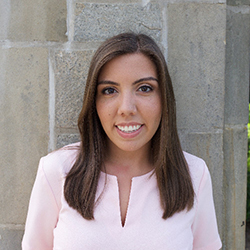
Nicole Palas
Class of '20
Undergrad Degree: BA in Psychology, Behavioral Neuroscience, Minors in Italian and Politics
Hometown: Wantagh, NY
Extracurricular Activities: Play Like a Girl (co-president), Phi Beta Kappa, Alpha Sigma Nu, Alpha Mu Gamma, Psi Chi, Pi Sigma Alpha, Phi Beta Kappa Sophomore Book Award, Dean's List
What were your reasons for choosing Fairfield University?
One of the many reasons that I chose to attend Fairfield University was its inviting campus and close proximity to major cities like Boston and New York. Walking around campus, it was evident that the students were welcoming and considered Fairfield a second home. Additionally, I knew that I wanted to attend a school where I could create connections with my professors and not just be a number in a class. Watching students interact with professors and rave about the support they provide further asserted my decision.
Why did you choose your major?
Coming into college, I had an idea that I wanted to attend law school after graduation. Psychology is at the basis of many careers, and I knew that I would excel in it because of my interests. I also chose to minor in Italian because it was something I had studied for many years in high school. After taking my base Italian classes, I really enjoyed the professors and classes offered, so I decided to continue my studies as I knew it would be useful in understanding legal terms later in my legal career.
What were the best aspects of your experience at Fairfield?
The best aspects of my experience were the lifelong friends that I made. I never thought that after just a few short months of meeting new people I would feel like they were my second family.
What interesting projects, research opportunity, or leadership experience were you involved in at Fairfield?
Throughout my last two years, I completed research with Dr. Henkel in the Psychology Department. I worked in her research lab testing participants in memory task. Conducting research was something I never knew undergraduates students could engage in, and I was overjoyed that this opportunity combined both my passion for psychology and interest in law. The summer before senior year I attended a research conference to present a poster on eyewitness testimonies and false memories. This led me to continue conducting independent research under my professor's supervision throughout my senior year. This experience allowed me to stand out amongst other candidates applying to law school. Research was an aspect of my academic career that contributed the most to my learning because it allowed me to apply everything I learned inside the classroom.
What would you tell a student who is considering attending Fairfield as an undergraduate?
If I had to go back and do it all over again, I would choose Fairfield every time. Fairfield allowed me to complete so many more things than I imagined. Not only did I make lifelong friends, but I became president of a club, gave tours to prospective students, and completed research for two years. Fairfield's faculty is one of the main things that make this school so special. They truly care about their students and go out of their way to ensure they succeed both in and out of the classroom. The faculty is engaging, personable, and supportive to each and every student. If you want to attend a school where you know you will succeed academically while also being challenged to analyze your own thinking, then Fairfield is the place for you.
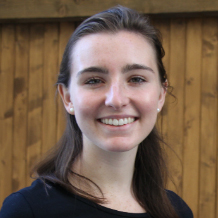
Maureen Perry
Class of '19
Undergrad degree: French and Politics
Hometown: Sharon, MA
Extracurricular Activities: Student Ambassador, Club Volleyball
How/why did you select your major/minor?
Having studied French since I was in sixth grade, I knew that when I came to college I would want to continue to learn the language. I had originally intended on pursuing a French minor, but I attended one of the University’s Majors and Minors Fairs, and the language faculty convinced me to declare a French major. If I had taken a French minor, I would have already completed the requirements, terminating my language studies. As the language faculty highlighted to me, as soon as I stopped taking French classes, I would no longer use my language skills, and my level would begin to decline. Additionally, I’ve known since I began taking French in high school that I wanted to study abroad in France, and my language ability would only improve by taking the greatest amount of French classes possible. Since declaring my French major, I’ve found that not only have my French skills improved, but I’ve also learned so many transferable skills that apply in other classes and in interpersonal interactions. Learning a language changes the way in which one looks at the world, and I consider myself very fortunate to be able to continue to study French at Fairfield.
How/why did you select your major/minor?
The faculty at Fairfield - especially within the language programs - are eager to help students and tailor class content to appeal to their interests. I have found that the French professors are extremely responsive and available to students, both by email and during their office hours. Additionally, they are more than willing to schedule individual meetings to sit down and chat with students, review before tests, talk about ideas for paper topics, or explore future career options. The faculty is passionate about teaching, and it thoroughly shows in their lessons. From the moment they walk into the classroom, they are eager to teach and to converse in the target language. I have found that coming to class and actively participating is much easier in an environment where the professors are so passionate and care about the content that the students are learning. My French skills have grown immensely due to the commitment of my professors, and I know they will continue to serve as a resource for me even after I graduate.

Emily Hayes
Class of '17
Undergrad Degree: Professional Writing and Italian Language
Graduation year: 2017
Hometown: East Windsor, CT
Extracurricular Activities: Lean In, Italian Club
How/why did you select your major/minor?
In high school, I studied Spanish and really enjoyed it. When I entered college, I wanted to take a new language, but I was not sure which one. My mother's side of the family is Italian, and continued Italian traditions during holidays. Wanting to understand more about the culture and language of my ancestors, I decided to take Italian courses and fell in love with the beauty of the language. After taking Italian for over a year, I decided to pursue a career that would allow me to use my language and writing skills, such as translation. I decided to double major in English, with a concentration in Professional Writing, and Italian Language.
Describe a project done through the program that you are particularly proud of.
While studying abroad in Florence, I took an Italian Contemporary Literature class in Italian and interned with the first Tuscan Anglo American Festival. They did not have a website or social media pages, and when I joined the team, the event was only three and a half weeks away. I was given full license to build the website in English and Italian, and all of the social media pages from the ground up in three weeks. This included developing content for the blog to promote the event. I reached out to the artists on my own to write about their work, which would be showcased at the festival and travelled to their studios (sometimes outside of Florence) by myself. A good number of the artists couldn't speak English, so I interviewed most of them in Italian and sometimes broken English. It was a truly unforgettable experience and my favorite part of studying abroad. I have gained so much through the Italian Program at Fairfield!
What attributes regarding the faculty did you find particularly helpful/encouraging?
Professor Diaz of the language department was really helpful and encouraging when I was interested in continuing the study of Italian. She encouraged me to double major and helped me plan out which classes to take so I could fit them into my schedule. She is also the one who told me about the program that allows American students who are studying abroad in Florence to take classes in Italian with Italian students. Professor Diaz organized the i-Italy internship for me and gave me this wonderful opportunity, which eventually led to an internship with the writing team at Save the Children, where I continue to practice my Italian with the employees there. She has been incredibly helpful and really cares about her students. She wants to see them do well and does everything she can to encourage the continuation of the study of Italian language. Professor Carolan encouraged my internship with the festival while I was abroad and continues to expose her classes to important Italian films, music, and literature.
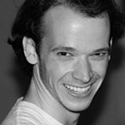
Kelan McDonnell
Class of '15
Undergrad Degree: BA MLL French/German
Current Hometown: Heidelberg, Germany
Graduate School: U. Heidelberg BA Translation Studies German/Engl./French
How did you select your major/minor?
When I arrived at Fairfield I knew that I wanted to major in French. Over the course of four years that never changed even though I added and dropped double majors and minors along the way. The decision to major in French was made based on my experiences in high school. French class was the one class that I looked forward to every day because it was always interesting and engaging. When I graduated high school, I participated in a two-week immersion trip to France. This introduction to a new culture and way of life inspired me to pursue the study of foreign languages. Double majoring in two foreign languages has been one of the best decisions of my academic career.
I was fortunate enough to spend my entire junior year abroad as an exchange student in both France and Germany. During that time I made extensive progress in my speaking abilities and enhanced my understanding of the diversity of European culture. My time as an exchange student prepared me to return to Europe and further my studies. I am currently enrolled full-time in a German language bachelor degree program in translation studies.
How did Fairfield's Jesuit education prepare you for your future?
Fairfield's dedication to a well-rounded education in multiple academic disciplines led me to where I am today. At the time I chose to attend Fairfield, fewer and fewer universities offered majors or minors in a foreign language, a trend that has unfortunately grown and continued today. The opportunity to major in French started a chain reaction that propelled me to my current location. As a foreign language major, I took advantage of the ability to study abroad for an entire year. My personally and academically rewarding experience in France and Germany prompted my addition of a second major in German. Then, upon graduation I made plans to return to Europe. Currently, I am enrolled in a three-year long bachelor degree program in translation studies designed for German native speakers at the University of Heidelberg. When I am finished, I plan to pursue a master's degree in either translation or interpretation in order to continue learning and sharing different languages and cultures. I would not have the same success in these studies without a degree in a foreign language from Fairfield.
Describe a project done through the program that you are particularly proud of
As a senior I designed a personalized capstone course in French to English translation with my academic advisor Dr. Goldfield (Dept. MLL). In lieu of a traditional capstone paper, I translated the first act of a 19th Century French play as an applied representation of the research I did throughout the semester. Dr. Goldfield guided me through the process of translation which involved not only enriching my vocabulary, but also improving my ability to analyze how certain factors such as the time period in which the play was written, the socio-economic background of the playwright and the audience affected the language of the text. My studies of 19th century French language and culture were paralleled by similar research into the language and culture of Britain during the same time frame. The culmination of the research was a translation of French playwright Feydeau’s farce written in the style of a 19th Century Oscar Wilde play. After revision and edits well after the semester’s end, the final product won the 2015 DiMenna-Nyselius Library Research Prize at the undergraduate level.
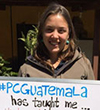
Emma Cannon
Class of '14
Peace Corps Volunteer
A JUHAN fellow at Fairfield, Emma double majored in international studies and Spanish with a focus on Latin America. Emma was a Peace Corps volunteer in Guatemala for two years, where she worked in support of the Healthy Schools Project, a national initiative that aims to improve basic health and hygiene in primary school students in rural Guatemala. She received the JUHAN Humanitarian Citizenship Award in 2014. She currently works at University Research Co., LLC (URC) & Center for Human Services (CHS) Support Zika Response activities in Guatemala, Honduras, El Salvador, Dominican Republic, Nicaragua, Paraguay, Peru, Ecuador and Jamaica. She is currently pursuing a degree in nursing.
Undergrad Degree: International Studies and Spanish with a focus on Latin America
Hometown: Georgetown, MA
Extracurricular Activities: Jesuit University Humanitarian Action Network (JUHAN) Fellow, Fairfield Volunteer Corps (FVC) Co-leader, Service Learning Associate, City of Bridgeport Department of Sustainability Intern, AmeriCares Latin American Department Intern
Post-graduation: Peace Corps volunteer in Guatemala
Tell us about your experience as a member of the Peace Corps
As a Peace Corps volunteer in Guatemala, I work in support of a national project called the Healthy Schools Project. The goal of the project is to improve basic health and hygiene in primary school students in rural Guatemala. As a volunteer under this project, I work in a school district for the superintendent of its rural primary schools. Within the schools, I work to train and support teaching in creating a healthy physical and psychosocial school environment for the students. Improvements to the physical environment can include hand-washing sinks, proper trash disposal, planting schools gardens, health corners in classrooms with personal hygiene items for each student, etc. Psychosocial improvements can include talks and activities with kids on topics such as self esteem, goal setting, etc. I also train teachers in a teaching format called 4MAT as a means to teaching health topics in a dynamic and interesting way that appeals to a number of different learning styles. Finally, within the schools I also work on the strengthening of relationships with outside groups and institutions such as parent associations, local government, and NGOs.
Outside of the schools, I am also working to help set up a Healthy Schools project infrastructure that will endure beyond my service. This includes a municipal Healthy Schools committee, as well as a departmental level Healthy Schools committee. In conjunction with the National Healthy Schools committee, these committees will be a means of support for schools. Actors of the committees come from different ministries (health, education, food security, agriculture, etc.), NGOs, and other groups that can support the schools in the development, expansion, and sustainability of the project.
And of course, as with all Peace Corps volunteers, a big part of my work is community integration and building relationships of trust and understanding. By living in the community that I work in, I am able to do so. As a volunteer, I also work to learn about Guatemalan culture and society with the goal of sharing my knowledge with friends, family, and others back in the United States. I also work to share US culture and promote a great understanding of it among the Guatemalan people.
Describe the ways that the university’s Jesuit mission and identity had a positive influence in your academic and personal experience while at Fairfield.
Fairfield University’s Jesuit mission and identity were not initially what appealed to me about Fairfield. Instead, it was something that I internalized over my four years as a student. As a Magis scholar, ‘magis’ meaning, ‘more,’ I was often reminded that more was expected of me- academically, in my extracurricular activities, and in how I chose to conduct my Fairfield experience. Shortly after becoming a student, I came to find that I no longer needed the external reminder, because I had come to set that bar for myself. I took service learning courses, became involved in volunteering in Bridgeport, and became a member of the humanitarian action group JUHAN, through which I learned about the complex humanitarian crises of our world today and the small but important impact we could create as a group on the Fairfield campus. In sum, I believe that the influence that the Jesuit mission and identity had on my college experience led me to work hard and constantly strive for more. It led me to think of the impact my decisions have on others and the impact that I can have on others through conscious decision-making. It is that last part that led me to Peace Corps.
When you were at Fairfield, what attributes regarding the faculty did you find particularly helpful/encouraging?
I found it helpful that my professors constantly challenged me and expected excellent work from me. Whether it was a paper, a test, or a presentation, I always felt that my professors would not accept mediocre work from me. We all need an extra push sometimes when it comes to doing our best work, and I always felt that my professors were there to give me that extra nudge. At the same time, I also felt that they trusted me, and that they often treated me as a peer. I was able to build personal relationships with them, seek advice from them, and even spend time with them outside of the classroom or during the summer. As a senior in college deciding on my next step, they were there for far more than letters of recommendation. I felt that they were invested in helping me to achieve success and finding work that I am passionate about. My Fairfield professors have been mentors, resources, cheerleaders, and friends. And now, graduated from Fairfield and living abroad, I still communicate with a number of them and know that I can always reach out for advice and support.

Ali Famigletti
Class of '14
Undergrad Degree: English (concentration in teacher education) and Italian
Hometown: Lynbrook, New York
Extracurricular Activities: RA for Gonzaga; Peer Mediation Club Leadership Member; Studied abroad in Florence, Italy
Honors and Awards: Magis Scholarship, Alpha Mu Gamma: Foreign Language Honor Society, Sigma Tau Delta: International English Honor Society, English Department Award in Creative Non-Fiction 2013
Currently: Enrolled for a Master's in Italian with Middlebury College Language Schools. The program features a 6 week intensive summer session in Oakland, California on Mills College Campus and an academic year abroad in Florence, Italy
Why did you choose to study your major at Fairfield University?
I came into Fairfield with a declared major in English. I chose to study English because it was (and is) my passion. Fairfield's wide variety of course offerings in English challenged me to engage with ideas I never considered before. They also enhanced my reading, writing, and oral skills which have become crucial to my progress in and out of the classroom. My grasp of the English language and my passion for sharing the human experience developed profoundly with the inspirational guidance of my amazing professors.
In my second semester as a first-year student, I added Italian as my double major because it was (and is), my second passion. I chose to take classes in Italian as part of the core-language requirement. These classes showed me that studying a second language would be imperative to my success after college and to my growth as an individual through cultural enrichment. I achieved an advanced level of facility in the Italian language and deepened my immense appreciation for what I consider to be one of the most authentic and resonant cultures in the world.
How have you been inspired in pursuit of your academic interests?
The members of the English and Italian departments at Fairfield have been essential to my success as a student and my personal growth these past four years. When I expressed that I wanted to study abroad in Florence, Italy during the spring semester of my junior year, my multiple advisors were extremely supportive and encouraged me to do something outside of my comfort zone. With their guidance, I opted to partake in an academic internship as an ELTA (English Language Teaching Assistant) in two elementary schools outside of Florence. As an ELTA, I used my English major skills to help 3rd and 5th grade Italian students learn English. As a student of Italian language and culture, I used my Italian major skills to navigate around the city of Florence the country of Italy. This experience was the ultimate fusion of my academic interests and personal goals. I was completely inspired to continue working in both of these fields after experiencing them first hand last spring. After graduation, I will return to Florence to work for Fairfield University as the Program Assistant for the Fairfield Florence program. Four years ago, I would never have dreamed that this opportunity was possible. Today, I can't imagine myself doing anything else.
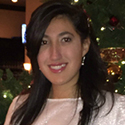
Delicia Alarcon
Class of '14
Undergrad Degree: Psychology and Spanish Minor: Educational Studies
Hometown: Bridgewater, NJ
Extracurricular Activities:FUSA Senate, Alpha Mu Gamma (Language Honor Society), Psi Chi (Psychology Honor Society), New Student Programs (First Year Experience and Orientation Leader), Peer Mediator, Barone Campus Center Building Manger and Information Desk Attendant, Head Start Teaching Assistant, Senior Week Brunch Chair, Casar Batalla Elementary School Reading Tutor, Career Planning Center Office Assistant.
Post-Grad Position: Teach For America, South Carolina 2014 Corps Member: Secondary Spanish Teacher (grades 9-12); University of Scranton, Program Coordinator, Cross Cultural Centers (Multicultural Center)
What did you choose to attend Fairfield University?
I visited Fairfield University as a high school junior because a friend of mine went there and suggested I visit the campus. I was the only prospective student on the tour and had the guides' undivided attention as she told me about Fairfield's history and traditions. What impacted me the most was when the tour guide sent me a hand-written postcard at home thanking me for the visit. This small gesture led me to realize that Fairfield was a special place I wanted to apply to. When I received my acceptance and attended the Magis Scholars weekend, I knew I had to think about where I wanted to spend the next four years. The most influential component to this weekend was the people I met. Everyone had a different Fairfield experience but each one was positive. From faculty and staff to students, everyone genuinely expressed their joy in being a “Stag.” The values of “Excellence” and “Men and Women for Others” were at the core of every conversation. There was a sense of community and family, and I instantly felt welcomed and a part of the greater mission and identity. The classrooms I sat in allowed me to envision myself as a student on campus where I would be challenged to think and learn from my peers. Fairfield seemed like a place my dreams and goals could become a reality. That weekend, I made friends who would later become my mentors and closest peers on campus when I ultimately decided to attend Fairfield. On this campus I saw myself growing and learning about others. These experiences prepared me to become a Global Citizen.
What attributes regarding the faculty did you like best?
One attribute that resonated with me during the Magis Scholars weekend I attended was the close-knit community Fairfield had to offer and the relationship students could form with their professors. I didn't believe this could happen since I was under the false impression that professors did not have enough time to meet students. While in many instances they actually do not have the time, they still make the time. That is the difference with Fairfield University and the faculty I have had the pleasure to work. The relationships and mentorships I formed with Dr. Johnson and Dr. Farrell in the Spanish Department have shaped my postgraduate career. They took the time listen to my stories, worries and passions with an open mind and provided me with resources for the next steps. In addition to career conversations, I spent countless hours after class discussing life, society and what it means to be a successful person with them and found their experiences helpful and encouraging. They reminded me to take a step back and examine the bigger picture and enjoy the classes I was taking and immerse myself in service. When I followed their simple advice, I learned what I could offer my fellow peers and community. I will forever treasure these conversations with my professors for they are what have guided me throughout college and continue to influence my decisions and life trajectory.
How/Why did you select your major/minor?
One of the classes I attended when I visited Fairfield was Dr. Primavera's developmental psychology course. In this class, she challenged students to envision a world where every single child had access to a quality education, good nutrition and a safe environment to thrive in. In my optimistic mind, I thought everyone already had the necessary resources to grow and be successful individuals. We later learned the heartbreaking statistics that exist in our society regarding how many children live and grow up in poverty and experience traumatic experiences throughout their lifetime. Therein began my journey in social justice advocacy work. The first step was to attend Fairfield University and major in Psychology so that I would have access to those conversations and professors who were involved with this type of work.
My second major, Spanish, was rather easy to select. I have a love for the Spanish language and literature because my family is from Paraguay and I grew up speaking Spanish. In essence, both majors allowed me to learn about people, society and how we work together. Through psychology, I learned about the individual and what drives their actions and behaviors. Through Spanish, I learned about different cultures, literature and how to effectively communicate in another language. Thus, it was easy to pick my majors and minors because I knew I wanted to be a part of classes where we would spend time reading about the great pioneers of those fields and later discuss how we could be agents of change in society.
Describe a project or an activity that you have been involved with through the program that you are particularly proud of.
One of my favorite memories at Fairfield University took place senior year at the Department of Modern Language Film Series. I was asked to participate as a moderator for a panel discussion with Dr. Javier Campos, Dr. Gisela Gil-Egui and Dr. Michelle Farrell regarding the movie "No” and how it relates to Latin America and political representation in the media. Given my Peruvian background, Dr. Gisela Gil-Egui and I instantly formed a kinship based on our love of Latin America. In the Spring of 2014, we discussed potential scholarship and grant opportunities to develop research opportunities in Paraguay as part of my post graduation plans. Through these conversations, I had the opportunity to work with Gisela on a peer-to-peer level and we developed an instant bond that I deeply cherish. She helped me navigate thoughts and ideas for post graduation, and I saw her as one of my mentors. I am reminded that these types of relationships are what we remember in our life as catalysts for our development. This is the core of a Fairfield University education.
Describe a favorite course and how it helped your academic growth.
One of my favorite courses at Fairfield University was Spanish 360: Dictatorships and Revolutionary Movements in Contemporary Latin America. Among the many Spanish courses offered, this particular one revolved around topics that I grew up learning about at home. My grandfather was a revolutionary activist during the Stroessner regime in Paraguay during the 1950's. Therefore, learning about other Latin American countries and their experiences helped develop my academic growth in many aspects. I learned how to analyze film, stories and books in Spanish and was challenged by Dr. Farrell to look at how society was depicted in these stories and accept them as only way representation of what happened in history during that time. In addition, this class led me to realize my passion for Latin American Studies and how documentaries and film have the power to influence an audience. As a result, the stories we all tell shape how people view us.
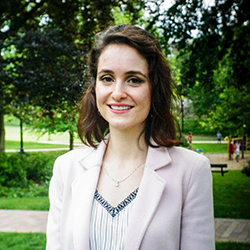
Klevisa Kovaci
Class of '14
Undergrad Degree in (plus any area of concentration): Bachelor of Arts in International Studies, French, and Politics
Hometown: Trumbull, CT
Extracurricular Activities: Research Assistant in the Politics Department, Teaching Assistant for French, Model United Nations, French Club, University Symphony Orchestra
Graduate School: Dual degree program at Columbia University (Master in International Affairs) and Sciences Po (Master in International Development)
Describe a project done through the program that you are particularly proud of:
One of the highlights of my college career was working as a Teaching Assistant of French in the Modern Languages and Literatures Department. I got the amazing chance to teach 1-3 weekly Oral Practice Session (OPS) classes of French each semester, under the direction of Professors of French: Dr. Joel Goldfield and Dr. Zoe Erotopoulos. Using the Rassias Method in my classes, I grew academically, professionally, and personally by strengthening my French and teaching skills. This job reinforced my appreciation for French, teaching, and working with young people.
I formed lasting friendships with my language teaching assistant colleagues, who were from many countries. I also learned so much from my students and the experience. In fact, thanks to my network in the French major, I later became an Assistant Teacher for the Rassias Language Program in France. By working as a language teaching assistant, I gained professional skills; a valuable network of mentors, colleagues, and friends; and new opportunities during and beyond Fairfield University.
What attributes regarding the faculty did you find particularly helpful/encouraging?
The faculty of the Modern Languages and Literatures Department is supportive of students in many ways, such as individual tutoring during office hours. One of my favorite aspects about the faculty is their work in supplementing academic courses with opportunities outside the class. For instance, the professors of French were immensely supportive of French Club and in encouraging students to attend Francophone-related events. Another experience that illustrates this is when the Alpha Mu Gamma faculty leaders took a group of students to attend the National Language Honors Society Convention in Chicago.
In the Modern Languages and Literatures Department, the energy and encouragement that faculty provide for students creates an enabling learning environment. From my experience as a student and assistant teacher in foreign language, I noticed a unique synergy, cooperation, and camaraderie between the professors of different languages. This served as a positive model for me and for other students. The department faculty and staff seem like a family, united by the goal of helping students to achieve their best in foreign language.
Describe a favorite course and how it helped your academic growth.
A course that stands out for me was “Francophone Cultures,” taught by Dr. Sourieau. This was an advanced level course in which students learned about cultures, histories, and populations of French-speaking countries outside of France. Dr. Sourieau utilized challenging and intriguing texts from different world regions. Before long, my classmates and I were discussing effects of colonialism and development in French-speaking countries. I found myself writing at my highest level and giving a 15 minute presentation on French territories, political systems, and economic growth.
This course is unique for its full integration of foreign language with history and social sciences. Foreign language is used in international cooperation and business. And in this class, I advanced my language skills while actively applying French in political, economic, and social deliberations of current issues of today.
More About Modern Languages & Literatures
Frequently Asked Questions
All new students, both incoming first-year and transfer, with academic or life experience in one of the following languages: Chinese, French, German, Italian, Russian, Spanish, should take the online WebCAPE Placement Exam prior to beginning classes at Fairfield University.
Since there is no language placement exam in Arabic, Hebrew, Japanese, Portuguese, Latin or Classical Greek, all new students, both incoming first-year and transfer, with academic or life experience in these languages, should follow the advice given by the representative faculty from the Department in Modern Languages and Literatures or Classical Studies at Orientation.
You are free to start a new language offered at Fairfield University: Arabic, Chinese, French, German, Classical Greek, Hebrew, Italian, Japanese, Latin, Portuguese, Russian, and Spanish, whether or not you have already studied one or more of these modern or classical languages. If you are starting a new language at Fairfield University, you do not and should not take the placement test in this new language. Instead, please register for the elementary level 110 (e.g. CI 110) of that language.
If you are a high school student, you should take the language placement exam in the spring of your senior year of high school prior to arriving at Fairfield. Please check your Orientation materials for specific dates for taking the Placement Exam.
Every undergraduate student at Fairfield University, beginning with the Class of 2023, must complete one semester of a language as part of the Magis Core. Depending on one’s program of study, the student will also be required to complete a second semester of that same language OR a second mathematics course. Because Fairfield University is committed to each student being exposed to other cultures/traditions as part of a liberal arts education formation, there will be no place-outs of the one semester language requirement.
Students who have developed proficiency in one language are strongly encouraged to consider taking advanced classes in that language or starting a new language.
Modern Languages and Literatures majors often double major or minor in Communication, English, International Business, International Studies or Politics as well as other areas of study. Foreign Language Minors often major in the preceding disciplines or Accounting, Art History, Biology, Marketing, Mathematics, Psychology, as well as other fields. Certain languages are closely connected with areas of study offered in interdisciplinary Minors and are likely to be either required or approved electives. For example, a student interested in Asian Studies will want to consider starting Chinese and/or Japanese; a student interested in Italian Studies, Italian; a student interested in Latin American and Caribbean Studies (LACS), Portuguese, French, or Spanish; a student interested in Russian, East European, Central Asian Studies, Russian. The U.S. Government treats Arabic, Chinese, Japanese, Portuguese and Russian—as Critical Languages important to strategic interests and scholarships may be available for immersion study in these languages. Any of the 12 foreign languages offered at Fairfield could be included in an individually designed major.
For students of Latin and Classical Greek, the Classical Studies Program similarly offers a minor in Classical Studies as well as a full major through the individually designed major.
Language placements tests for Fairfield University students are free of charge.
Current policy specifies that only the first score earned from one of our online placement tests will count for that language unless a suitable rationale for retaking the test is accepted by the Chair or members of the language placement team.
After attending a full week of classes, if you still think you want to change the level within the language you are taking, you must discuss it with the instructor first and then get the approval from the Department Chair.
If you have previous academic or life experience in Chinese, French, German, Italian, Russian, Spanish, write to languageplacement@fairfield.edu. If you want to continue your study in Arabic, Hebrew, Japanese, and Portuguese, languages for which there is no placement exam, you can contact the Chair of Modern Languages and Literatures for more information. Students who are starting to learn a new language do not need to take the Placement Exam in this new language.
Students who have previous academic or life experience in Latin or Greek will be placed according to your background and information obtained on the Academic Interest Questionnaire by a faculty member in the Classical Studies program.
